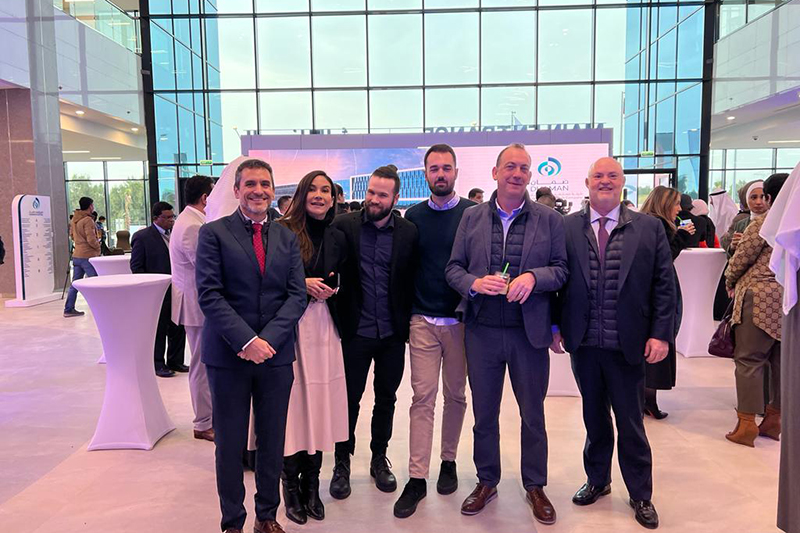While I was travelling to Kuwait last week, I was thinking about how, thanks to the public-private collaboration model that we started with our first hospital in 1999, we at the Ribera Healthcare Group have had the opportunity to meet very interesting and different people from almost every corner of the world. On some occasions we have been invited to their countries to explain our management model, which gives such good results to citizens and is a case study in universities such as Havard or Berkeley. On other occasions international delegations have visited our hospitals to learn about our model of integration of primary and hospital care, our technology and our innovative people policy and our social responsibility towards the community.
Working in an international company puts many stamps in your passport, forces you to spend many days away from your home and family, sometimes on special dates, but also allows you to get to know other cultures, customs and ways of managing services, such as health, working in multicultural environments, and with administrations and governments of all kinds.
Undoubtedly, all this diversity brings unparalleled value to the Ribera Group. Even more so when we have the opportunity to become actively involved in specific projects, with professionals from the surrounding area, and when we have first-hand knowledge of the real needs of the citizens of each region of the world. This was the first thing we detected in our first contact with Latin America and the hospitals in which we have a small participation in Peru. We experienced it more intensely in Central Europe, where we bought the high-tech company Pro Diagnostic Grup (PDG) in Slovakia and OBK Klinic, the bariatric and high-complexity clinic in the Czech Republic, and more recently when we took over the management of Cascais Hospital in Portugal. We have also developed technological projects with Futurs in the United Kingdom and Saudi Arabia.
In the specific case of Kuwait, the experience of our alliance with a corporation such as Dhaman Hospitals has been very satisfactory in both professional and human terms. Not only for the management team most involved in the project, but also for dozens of our professionals, who have travelled at different times to this Middle Eastern country, to collaborate in the implementation of two hospitals and several primary care centres. It is a very ambitious project, which is going to allow Kuwait to make a qualitative leap in the quality of healthcare for its citizens, and also for expatriate workers. And Ribera is already part of this legacy.
Let me tell you briefly. Kuwait has allowed us to get to know in a single project the public-private partnership that we advocate, at other levels and in a very different country, involving citizens and institutions in the renovation and improvement of their health infrastructures. Working with Dhaman on such an important health project for the region has been a magnificent experience, full of learning for both of us.
My first assessment of the project, which is still underway but which I would like to share in this blog, is that Ribera not only brings to Kuwait its know-how, based on 25 years of experience in healthcare management in a public-private partnership model. It also brings with it what I like to call «the genetics of internationalisation». Because this capacity for adaptation, immersion and creating multidisciplinary teams is in our DNA. And it is a characteristic that undoubtedly sets us apart from other healthcare and hospital groups.
In Kuwait we met very different people and realities, but with needs and challenges similar to ours. Once again, we have seen, as Covid has shown, that the challenges of healthcare are the same for everyone, and that it is only necessary to adapt global solutions to local realities.
My second reflection has to do with our people, the professionals of the Ribera Group. This project in Kuwait, like so many others, has been possible thanks to the genetics of internationalisation that many already have in the group. A genetics open to diversity, to cultural exchange, to equality, to flexibility and to the ability to organise and react. I am very proud that this characteristic is not only part of those of us who have been leading this type of project for many years. To see that the professionals who have joined our organisation have the same vision and are clearly committed to the internationalisation of our responsible healthcare model is something that fills me with pride. They defend with solvency and much success abroad that Ribera is called upon to collaborate with all types of governments and institutions for the sustainability of health systems. Wherever we are required, of course. In fact, on my last trip to Kuwait, I went to dinner with the entire team there and asked them if they would be willing to participate in other similar projects, and the answer was unanimous and resoundingly affirmative. Thank you for that.
Finally, with regard to this project, I would like to thank the Spanish Ambassador to Kuwait, Miguel Aguilar, for receiving us at his residence to share views and knowledge about the area, as well as for his kind treatment and encouraging words about the importance of a sincere, honest and loyal collaboration between administrations and companies and to contribute to a greater rapprochement between the two countries.
For this reason, I would like to thank both our official ambassador and the «Ribera ambassadors», our professionals, for their good work, commitment and hard work. Without a doubt, our representatives abroad are the best calling card for Spanish companies that are committed to internationalisation.

